- Home
- Lynne Olson
Those Angry Days Page 22
Those Angry Days Read online
Page 22
Still, few, including Clapper, believed that would happen. Rep. Joseph Martin, the House minority leader and chairman of the convention, arrived in Philadelphia with the conviction, as he later recalled, that “Willkie, despite his barrage of publicity, was not a serious contender.”
WHEN THE CONVENTION BEGAN on Monday, June 24, no one was quite sure what to expect. France had capitulated to Germany the week before, and the specter of war hung over the convention as heavily as the crushing June heat. In one editorial cartoon, Hitler was shown standing in the middle of Philadelphia’s Convention Hall, with the caption THE UNINVITED GUEST.
On the eve of the GOP gathering, Willkie had called for immediate U.S. aid for Britain, adding that he was “in accord with the national administration” on the issue—a clear thumb in the eye to Republican isolationists. Enraged by his remarks, some fifty Republican members of Congress signed a letter urging the convention to choose a “leader with a past record consistently supporting Republican policies … and whose recognized position and recent pronouncements are a guarantee to the American people that he will not lead the nation into a foreign war.” They were reassured by the fact that most delegates were already committed to Taft or Dewey, who claimed he was within one hundred votes of clinching the nomination.
Willkie volunteers were frantically working to prevent that from happening. Among his most tireless campaign helpers in Philadelphia were the Herald Tribune’s Helen Reid, Dorothy Thompson, and Irita Van Doren, who, for fear of causing a political scandal, was keeping her distance from Willkie, at least in public. Dorothy Thompson was as vehement in her support of Willkie as she had been in her criticism of Charles Lindbergh. At dinner with Reid one night in Philadelphia, she pounded the table so hard that the dishes and glasses shook. “If the politicians won’t nominate Wendell, believe me, Helen, we can elect him ourselves!” she exclaimed. “I’ll go into the street and get the people to elect him!”
Yet despite the isolationists’ “Stop Willkie” movement, the touslehaired maverick continued to make impressive gains. In the middle of the convention, George Gallup announced a delay in the release of his latest poll, saying the results were not yet ready but acknowledging that “the Willkie trend has been sharply upward.” Indeed it was. When the results were published shortly after the convention ended, they showed that Willkie had shot past Dewey, 44 to 29 percent. Gallup was widely regarded as a Dewey supporter, and some in Willkie’s camp believed he had held up the poll results deliberately to help the New York district attorney.
Although Dewey and Taft had cornered the support of most GOP insiders, Willkie had collected a few party allies of his own, notably Samuel Pryor, the head of the party in Connecticut. As the official in charge of logistics for the convention, Pryor presided over the distribution of credentials for access to the hall, including tickets for spectators in the galleries. Unbeknownst to the Dewey and Taft camps, he had reduced the number of gallery tickets available for their supporters while greatly increasing those for Willkie backers. Among them were hundreds of members of Oren Root’s Willkie clubs, who had poured into Philadelphia from all over the country.
On the night of June 26, Willkie’s name was put into nomination by Charles Halleck, a young congressman from Indiana. When Dewey and Taft delegates disrupted Halleck’s speech with boos, hisses, and catcalls, they were drowned out by a cacophony of cheers and applause from the galleries, accompanied by a chant of “We want Willkie!” As Halleck finished his address, the chant swelled in volume. Thousands of people in the galleries were on their feet, whooping, stamping, clapping, and shouting over and over at the top of their voices, “We want Willkie!” With the noise growing ever more deafening, the relatively few delegates pledged to Willkie grabbed state standards on the floor and marched around, holding them high, as Dewey and Taft delegates tried to snatch them back. Fistfights and other scuffles broke out in a number of delegations, several of which had to be broken up by police.
It was, political writers later said, the most rousing, raucous convention demonstration since the days of Teddy Roosevelt. It was also a dramatic display of the cultural and political chasm that divided not only the Republican Party but the entire country. As the writer Charles Peters has noted, “most of the people on the floor … represented conservative, isolationist, small-town America. Most of the people in the gallery were on the other side.”
The following morning, the New York Herald Tribune carried a front-page editorial, the first in its history, urging the convention to nominate Willkie. In Philadelphia, tension and excitement mounted throughout the day as edgy delegates prepared to cast their ballots that evening. They were discomfited not only by the deafening Willkie demonstration the night before but by the blizzard of telegrams, letters, and postcards they had received throughout the week, demanding they choose Willkie. Later estimates put the number of such pro-Willkie missives at more than a million.
The 1940 Republican convention was the most suspenseful party gathering in years, and millions of Americans sat by their radios the night of June 27 to learn the outcome. The moment the balloting started, Willkie supporters in the galleries resumed their chanting. During the roll call, the heads of state delegations struggled to be heard above the din as Western Union messengers roamed the floor delivering last-minute telegrams. After the first ballot, Dewey led by 360 votes, followed by Taft with 189 and Willkie with 105.
After the second vote began, Rep. Joseph Martin tried to quell the furor by reminding those in the galleries they were there as guests of the convention. “Guests, hell, we are the convention,” someone yelled back. Martin couldn’t help but agree. “We professionals could not misread the lesson before us,” he later wrote. “Willkie was becoming more inflammable by the moment.”
As one ballot followed another in the sweltering hall, Willkie slowly but steadily gained support. “The suspense was so acute that I can feel it to this day,” Marcia Davenport recalled. She remembered, too, “the bitterness of the Old Guard, the adamant resistance to [Willkie], the hatred of him and all of us who had worked for this moment. I looked at Russell, pale and sweating, with his green eyes glittering in the hot glare. He was watching the floor where delegations were roaring and cursing at one another,” sometimes “almost at blows.”
Finally, at 1:15 A.M., after more than eight hours of voting, Wendell Willkie was nominated as the Republican candidate for president of the United States. Sheer pandemonium reigned as Willkie supporters screamed, cried, cheered, hugged one another, and continued to chant “We want Willkie!” Later, journalists and others would dub the events of that night “the miracle of Philadelphia.” H. L. Mencken was one of them. “I am thoroughly convinced that the nomination of Willkie was managed by the Holy Ghost in person,” Mencken, who was present at the balloting, wrote to a friend. “At the moment the sixth ballot was being counted, I saw an angel in the gallery. It wore a Palm Beach suit and was smoking a five-cent cigar, but nevertheless it was palpably an angel.”
In the weeks and months to come, Democratic party operatives would join Republican regulars in charging that Willkie’s nomination had been engineered by East Coast businessmen, Wall Street bankers, and publishers, who allegedly packed the convention galleries and helped generate most of the telegrams and letters that rained down on the delegates.
Marcia Davenport and others close to the Republican candidate denied the allegations, declaring that while the Eastern media did indeed help to ignite the pro-Willkie wildfire, the enthusiasm of ordinary Americans was responsible for its spreading throughout the country. According to Editorial Research Reports, an independent organization that investigated the pro-Willkie telegrams, most of them were indeed dispatched by average voters. “I knew the Willkie people in my hometown,” observed Charles Peters, a West Virginia–born writer and editor who wrote a book about Willkie’s nomination. “They were independent souls who did not march to any drummer but their own. What had started among a small coterie of the elite
had become a genuine people’s movement.”
Agreeing, The New Yorker’s Janet Flanner added a slightly different slant. “To millions of Americans sitting up after midnight over their radios, Willkie’s sudden, distant nomination … brought more than the febrile thrill that goes with a winning dark horse,” she wrote. “Because of the recent silencing of most European democracies, in the choice of Willkie that night there was, even to many cynical or Democratic ears, an exciting, stirring sound.” It was, Flanner noted, the voice of the people.
When Willkie spoke to the delegates the night after his nomination, he declared that where the war was concerned, “we here are not Republicans alone, but Americans.” His selection by the Republicans, in the words of Robert Sherwood, “guaranteed to the rest of the world—and particularly to the warring nations—a continuity of American foreign policy regardless of the outcome of the election.” An elated Lord Lothian told Churchill and the Foreign Office that they would have a friend in Washington, no matter who won the election.
German officials, meanwhile, viewed the interventionist’s victory as a major setback. “From the standpoint of foreign policy, Wendell Willkie’s nomination is unfortunate for us,” the German Foreign Ministry dourly acknowledged. The German embassy in Washington had spent thousands of dollars to send fifty isolationist Republican congressmen to the convention to work for the adoption of an isolationist platform. In a cable to Berlin, chargé d’affaires Hans Thomsen reported that the congressmen, who were not aware of the source of their travel funds, were to lobby platform committee members and other GOP delegates. At the same time, Thomsen said, full-page ads would run in several American newspapers with the headline STOP THE MARCH TO WAR!
In his message, Thomsen described the Philadelphia scheme as “a well-camouflaged lightning propaganda campaign.” In reality, it was a total failure. Despite the congressmen’s efforts, the GOP adopted a foreign policy plank that was an uneasy compromise between isolationist and interventionist points of view; it opposed the idea of America’s going to war yet was willing to consider the idea of giving aid to “peoples whose liberty is threatened.” As H. L. Mencken saw it, the platform was “so written that it will fit both the triumph of democracy and the collapse of democracy, and approve both sending arms to England or sending only flowers.”
Yet even if the plank had been outspokenly isolationist, it still would have made little difference. What Thomsen and the Germans didn’t seem to understand was that virtually no one in America, outside of Democratic and Republican regulars, paid attention to party platforms; Americans tended to vote for the candidate, not the platform. While German propagandists focused on influencing the content of the platform in Philadelphia, the party’s delegates slipped their leash and nominated an outspoken interventionist for president.
For their part, Roosevelt and the Democrats, while relieved that the choice of Willkie had eased the way for providing aid to Britain, were greatly concerned about the Republican’s popularity with voters. Acknowledging that Willkie would be the most formidable opponent he’d ever faced, the president told the columnist Walter Winchell: “His sincerity comes through with terrific impact. The people believe every word he says. We are going to have a heck of a fight on our hands with him.”
CHAPTER 13
“CONGRESS IS GOING TO RAISE HELL”
Even before Wendell Willkie’s selection, FDR knew he was in for an extremely tough election battle. According to a recent poll, more than half of those surveyed opposed the idea of the president’s breaking the two-term precedent set by George Washington. He still was popular, of course, with millions of voters, particularly those who’d been aided by his economic and social policies. But an increasing number of Americans seemed to be tiring of him and the New Deal, which, although it had alleviated many of the problems of the Depression, had not come up with solutions for ending it. “The President’s leadership in domestic affairs had accomplished everything that he could accomplish,” Attorney General Robert Jackson later remarked. “I do not think there would have been any justification for a third term on the basis of his domestic program.”
In the 1938 congressional elections, Republicans had picked up eight governorships, eight seats in the Senate, and more than eighty seats in the House. According to polls in the spring of 1940, the Republicans showed more strength than Democrats in a majority of states. “The shift toward the GOP is now so marked that nothing short of a Rooseveltian miracle … can save the election for the Democrats,” Time concluded in April.
Hitler’s invasion of Western Europe provided that miracle. In times of great crisis, Americans have traditionally turned to their president for leadership, and they did so with Roosevelt now. Within a week of the invasion, his popular support had shot up dramatically. It’s not clear when he made up his mind to seek a third term—he confided in nobody, not even his wife—but several key aides believed he made his decision just before or at about the time of the fall of France.
For more than a year, Roosevelt had been telling associates that he intended to retire after his second term. He was tired, he said, and his health was not as good as it once was. He remarked to Harold Ickes that he was “slowing down,” both physically and mentally. Eleanor Roosevelt confided to her husband’s closest aide, Harry Hopkins, that he “has not the same zest for administrative detail that he had and is probably quite frankly bored.”
While not ruling out the possibility of running again, he did nothing to discourage other Democrats from seeking the nomination. There was no shortage of prominent party figures who thought of themselves as Roosevelt’s logical successor. Among them were Postmaster General James Farley; Vice President John Nance Garner, who had been estranged from the president since the Court-packing fiasco; and Senator Burton Wheeler, who in November 1939 approved the formation of a Wheeler for President committee.
Although he never fully explained his decision to seek reelection, Roosevelt likely concluded that only he had the ability and experience to deal with the European crisis. None of the other Democratic contenders was up to the task, he felt, nor was Wendell Willkie. Of the Republican nominee, Roosevelt later wrote to a friend: “I did not feel that he had much knowledge of the world and that he would have had to learn … in the school of hard experience. This would have been a rather dangerous experiment in 1940.” Just as troublesome, in FDR’s mind, was the fact that a GOP election sweep would result in staunch Republican isolationists taking over key chairmanships in Congress. Senator Hiram Johnson, for example, would become chairman of the Senate Foreign Relations Committee, while the House Foreign Affairs Committee would come under the control of Rep. Hamilton Fish, an ultraconservative who despised Roosevelt as much as the president loathed him.
Yet once Roosevelt’s decision was made, he made clear to those around him that he would do nothing overt to capture the nomination. Harold Ickes urged otherwise, pressing the president to go to the convention and say “frankly and clearly” why he believed it was important to seek a third term. Such a statement, Ickes declared, “would raise this political campaign to such a high plane [that it would be] an inspiration to the whole country.”
Roosevelt ignored his advice. Keenly aware of the political touchiness of the third-term issue, he was determined to behave as if he were not actively seeking—and indeed had no interest in—another term. He also wanted a spontaneous demonstration of support from the delegates, “some show of affection, some semblance of genuine gratitude and loyalty from the party he led.”
Nonetheless, a number of administration officials continued to believe that there was a grain of truth in Roosevelt’s repeatedly stated lack of interest in another term. According to Solicitor General Francis Biddle, FDR was “bored and tired and stale.… He was not very much interested in his own nomination. It was as if he did not want to make the choice, and preferred to have someone make it for him.… He would not raise a finger.”
THE PRESIDENT’S LISTLESSNESS SEEMED to have
been transmitted to those participating in the Democratic convention, held in Chicago two weeks after the Republicans picked Willkie. The contrast between the two gatherings could not have been starker. Instead of the adrenaline-filled chaos of Philadelphia, a “dead, cold” feeling prevailed in Chicago, Ickes wrote. The columnist Marquis Childs called the convention “grim” and “grisly.”
On the convention’s second night, Senator Alben Barkley, the Senate majority leader and convention chairman, read a message from Roosevelt to the thousands of Democrats in the hall. In it, FDR declared that he had no desire to run for a third term and that the delegates were free to vote for any candidate they wished. For a moment, there was stunned silence. Not knowing how to react to the bombshell announcement, the delegates simply stared, first at Barkley and then at each other.
Then suddenly, a cry of “We Want Roosevelt!” reverberated throughout the cavernous space. Unlike the full-throated roar of the pro-Willkie crowds in Philadelphia, the call came from a single stentorian voice, amplified by loudspeakers, that chanted over and over: “We Want Roosevelt!” As a band played “Happy Days Are Here Again,” spectators in the galleries poured onto the floor, while the delegates, many still in shock, rose to their feet and joined the demonstration.
The next day, reporters traced the mysterious voice to one Thomas McGarry, Chicago’s superintendent of sewers, who, under orders from Mayor Edward J. Kelly, had sat in the basement of the convention hall and repeatedly shouted the “We Want Roosevelt” mantra into a microphone connected to the hall’s loudspeakers. Kelly, a key Roosevelt backer, had also orchestrated the demonstration that followed.

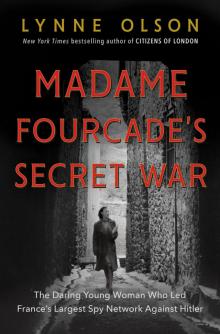 Madame Fourcade's Secret War
Madame Fourcade's Secret War Last Hope Island
Last Hope Island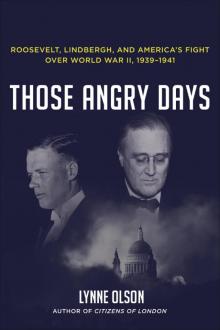 Those Angry Days
Those Angry Days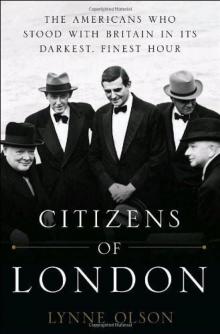 Citizens of London
Citizens of London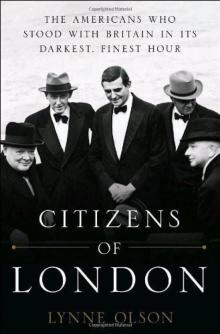 Citizens of London: The Americans Who Stood With Britain in Its Darkest, Finest Hour
Citizens of London: The Americans Who Stood With Britain in Its Darkest, Finest Hour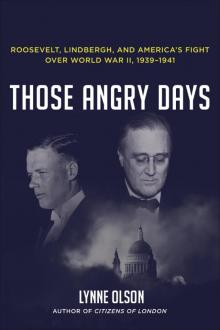 Those Angry Days: Roosevelt, Lindbergh, and America's Fight Over World War II, 1939-1941
Those Angry Days: Roosevelt, Lindbergh, and America's Fight Over World War II, 1939-1941